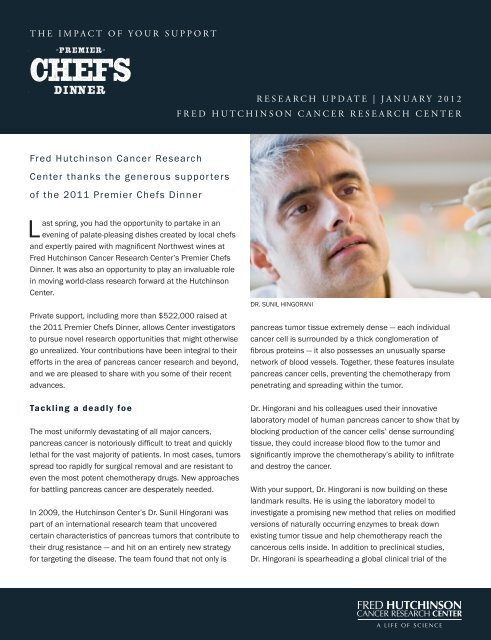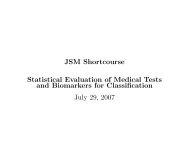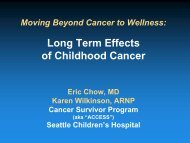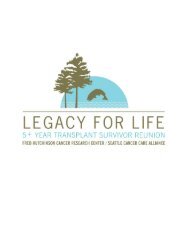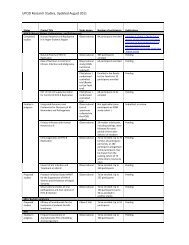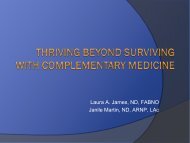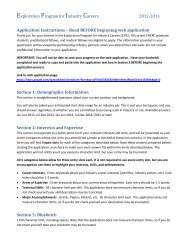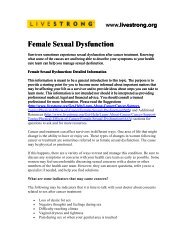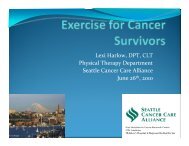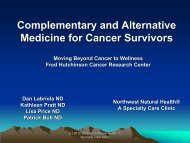Fred Hutchinson Cancer Research Center thanks the generous ...
Fred Hutchinson Cancer Research Center thanks the generous ...
Fred Hutchinson Cancer Research Center thanks the generous ...
Create successful ePaper yourself
Turn your PDF publications into a flip-book with our unique Google optimized e-Paper software.
THE IMPACT OF YOUR SUPPORT<br />
CHEFS<br />
~PREMIER~<br />
DIER<br />
<strong>Fred</strong> <strong>Hutchinson</strong> <strong>Cancer</strong> <strong>Research</strong><br />
<strong>Center</strong> <strong>thanks</strong> <strong>the</strong> <strong>generous</strong> supporters<br />
of <strong>the</strong> 2011 Premier Chefs Dinner<br />
Last spring, you had <strong>the</strong> opportunity to partake in an<br />
evening of palate-pleasing dishes created by local chefs<br />
and expertly paired with magnificent Northwest wines at<br />
<strong>Fred</strong> <strong>Hutchinson</strong> <strong>Cancer</strong> <strong>Research</strong> <strong>Center</strong>’s Premier Chefs<br />
Dinner. It was also an opportunity to play an invaluable role<br />
in moving world-class research forward at <strong>the</strong> <strong>Hutchinson</strong><br />
<strong>Center</strong>.<br />
Private support, including more than $522,000 raised at<br />
<strong>the</strong> 2011 Premier Chefs Dinner, allows <strong>Center</strong> investigators<br />
to pursue novel research opportunities that might o<strong>the</strong>rwise<br />
go unrealized. Your contributions have been integral to <strong>the</strong>ir<br />
efforts in <strong>the</strong> area of pancreas cancer research and beyond,<br />
and we are pleased to share with you some of <strong>the</strong>ir recent<br />
advances.<br />
Tackling a deadly foe<br />
The most uniformly devastating of all major cancers,<br />
pancreas cancer is notoriously difficult to treat and quickly<br />
lethal for <strong>the</strong> vast majority of patients. In most cases, tumors<br />
spread too rapidly for surgical removal and are resistant to<br />
even <strong>the</strong> most potent chemo<strong>the</strong>rapy drugs. New approaches<br />
for battling pancreas cancer are desperately needed.<br />
In 2009, <strong>the</strong> <strong>Hutchinson</strong> <strong>Center</strong>’s Dr. Sunil Hingorani was<br />
part of an international research team that uncovered<br />
certain characteristics of pancreas tumors that contribute to<br />
<strong>the</strong>ir drug resistance — and hit on an entirely new strategy<br />
for targeting <strong>the</strong> disease. The team found that not only is<br />
RESEARCH UPDATE | JANUARY 2012<br />
FRED HUTCHINSON CANCER RESEARCH CENTER<br />
DR. SUNIL HINGORANI<br />
pancreas tumor tissue extremely dense — each individual<br />
cancer cell is surrounded by a thick conglomeration of<br />
fibrous proteins — it also possesses an unusually sparse<br />
network of blood vessels. Toge<strong>the</strong>r, <strong>the</strong>se features insulate<br />
pancreas cancer cells, preventing <strong>the</strong> chemo<strong>the</strong>rapy from<br />
penetrating and spreading within <strong>the</strong> tumor.<br />
Dr. Hingorani and his colleagues used <strong>the</strong>ir innovative<br />
laboratory model of human pancreas cancer to show that by<br />
blocking production of <strong>the</strong> cancer cells’ dense surrounding<br />
tissue, <strong>the</strong>y could increase blood flow to <strong>the</strong> tumor and<br />
significantly improve <strong>the</strong> chemo<strong>the</strong>rapy’s ability to infiltrate<br />
and destroy <strong>the</strong> cancer.<br />
With your support, Dr. Hingorani is now building on <strong>the</strong>se<br />
landmark results. He is using <strong>the</strong> laboratory model to<br />
investigate a promising new method that relies on modified<br />
versions of naturally occurring enzymes to break down<br />
existing tumor tissue and help chemo<strong>the</strong>rapy reach <strong>the</strong><br />
cancerous cells inside. In addition to preclinical studies,<br />
Dr. Hingorani is spearheading a global clinical trial of <strong>the</strong>
THE IMPACT OF YOUR SUPPORT<br />
novel approach that is now enrolling patients with advanced<br />
pancreas cancer. Encouraging data from <strong>the</strong>se initial studies<br />
could lead to <strong>the</strong> development of a less toxic and potentially<br />
much more effective treatment option for <strong>the</strong> many<br />
thousands of patients suffering from this deadly disease.<br />
Lifesaving advances<br />
Pancreas cancer isn’t <strong>the</strong> only field in which our<br />
investigators are leading <strong>the</strong> way to breakthroughs. Across<br />
<strong>the</strong> <strong>Center</strong>, dedicated scientists and staff are leveraging your<br />
support to advance knowledge that will benefit those with<br />
and at risk for cancer.<br />
Progress in understanding breast cancer<br />
In two separate studies, Dr. Amanda Phipps and colleagues<br />
found that giving birth more times, having a higher body<br />
mass index, and being less physically active all increase <strong>the</strong><br />
risk of triple-negative breast cancer, a rare but aggressive<br />
disease subtype. Although never giving birth appears to<br />
lower <strong>the</strong> risk of triple-negative breast cancer, <strong>the</strong> team<br />
found that women who remain childless have about a 40<br />
percent higher risk of <strong>the</strong> more common estrogen-receptorpositive<br />
breast cancer. Toge<strong>the</strong>r, <strong>the</strong> findings highlight <strong>the</strong><br />
fact that breast cancer is really a complex combination of<br />
many diseases, which must all be better understood in order<br />
to enhance prevention, detection and treatment.<br />
Safer <strong>the</strong>rapy for brain cancer patients<br />
Dr. Hans-Peter Kiem and colleagues have developed an<br />
approach that could make chemo<strong>the</strong>rapy safer and more<br />
effective for brain cancer patients. The team introduced a<br />
chemo<strong>the</strong>rapy-resistant gene into cells that give rise to <strong>the</strong><br />
bone marrow and blood, which are particularly vulnerable<br />
to <strong>the</strong> toxic effects of chemo<strong>the</strong>rapy, and <strong>the</strong>n gave those<br />
modified cells to patients with glioblastoma, a terminal form<br />
of brain cancer. The results to date are encouraging. By<br />
shielding patients from side effects that normally limit <strong>the</strong><br />
amount of anti-cancer drugs that can be administered, this<br />
novel approach could enable doctors to use existing <strong>the</strong>rapy<br />
more effectively and potentially improve patient survival.<br />
Kate Prael Asgari, Director, Special Events<br />
Tel. 206.667.4919 www.fhcrc.org<br />
Mail Stop J5-200, PO Box 19024, Seattle, WA 98109<br />
DR. HANS-PETER KIEM<br />
Improving cancer survivorship<br />
A decade of work by <strong>Center</strong> researchers to refine marrow<br />
and stem cell transplantation for patients with blood<br />
cancers has significantly reduced <strong>the</strong> risk of treatmentrelated<br />
complications and death. A recent study compared<br />
patient outcomes in <strong>the</strong> mid-‘90s with those a decade later<br />
and revealed a 60 percent reduction in <strong>the</strong> risk of death<br />
within 200 days of transplant and a 41 percent reduction in<br />
<strong>the</strong> risk of overall mortality at any time after transplant. The<br />
data show clearly that <strong>the</strong> collective efforts of our dedicated<br />
researchers have significantly boosted <strong>the</strong> chances of longterm<br />
survival for our patients.<br />
Thank you<br />
Thank you, Premier Chefs Dinner supporters, for your<br />
<strong>generous</strong> investment in promising research at <strong>the</strong><br />
<strong>Hutchinson</strong> <strong>Center</strong>. Your contributions help sustain <strong>the</strong><br />
pioneering efforts of our researchers every day as <strong>the</strong>y<br />
endeavor to improve <strong>the</strong> lives of those with cancer and<br />
related diseases.<br />
>> Save <strong>the</strong> date<br />
Premier Chefs Dinner<br />
Sunday, May 20, 2012<br />
www.fhcrc.org/chefs


